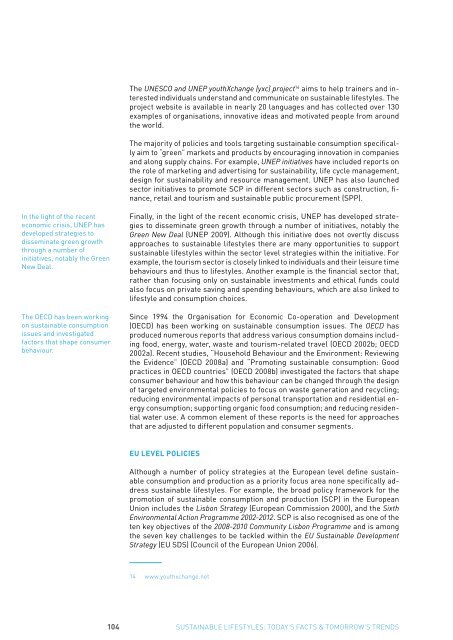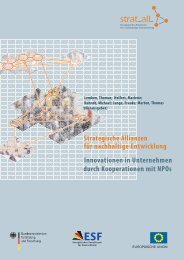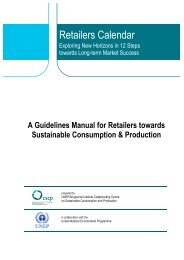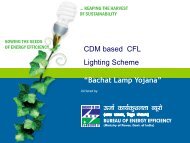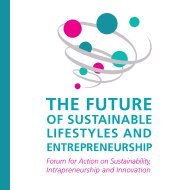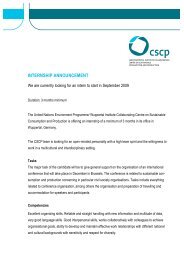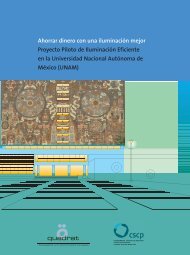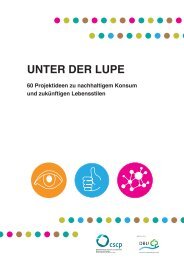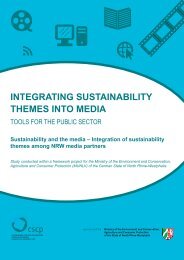today's facts & tomorrow's trends - SPREAD Sustainable Lifestyles ...
today's facts & tomorrow's trends - SPREAD Sustainable Lifestyles ...
today's facts & tomorrow's trends - SPREAD Sustainable Lifestyles ...
Create successful ePaper yourself
Turn your PDF publications into a flip-book with our unique Google optimized e-Paper software.
The UNESCO and UNEP youthXchange (yxc) project 14 aims to help trainers and interested<br />
individuals understand and communicate on sustainable lifestyles. The<br />
project website is available in nearly 20 languages and has collected over 130<br />
examples of organisations, innovative ideas and motivated people from around<br />
the world.<br />
The majority of policies and tools targeting sustainable consumption specifically<br />
aim to “green” markets and products by encouraging innovation in companies<br />
and along supply chains. For example, UNEP initiatives have included reports on<br />
the role of marketing and advertising for sustainability, life cycle management,<br />
design for sustainability and resource management. UNEP has also launched<br />
sector initiatives to promote SCP in different sectors such as construction, finance,<br />
retail and tourism and sustainable public procurement (SPP).<br />
In the light of the recent<br />
economic crisis, UNEP has<br />
developed strategies to<br />
disseminate green growth<br />
through a number of<br />
initiatives, notably the Green<br />
New Deal.<br />
The OECD has been working<br />
on sustainable consumption<br />
issues and investigated<br />
factors that shape consumer<br />
behaviour.<br />
Finally, in the light of the recent economic crisis, UNEP has developed strategies<br />
to disseminate green growth through a number of initiatives, notably the<br />
Green New Deal (UNEP 2009). Although this initiative does not overtly discuss<br />
approaches to sustainable lifestyles there are many opportunities to support<br />
sustainable lifestyles within the sector level strategies within the initiative. For<br />
example, the tourism sector is closely linked to individuals and their leisure time<br />
behaviours and thus to lifestyles. Another example is the financial sector that,<br />
rather than focusing only on sustainable investments and ethical funds could<br />
also focus on private saving and spending behaviours, which are also linked to<br />
lifestyle and consumption choices.<br />
Since 1994 the Organisation for Economic Co-operation and Development<br />
(OECD) has been working on sustainable consumption issues. The OECD has<br />
produced numerous reports that address various consumption domains including<br />
food, energy, water, waste and tourism-related travel (OECD 2002b; OECD<br />
2002a). Recent studies, “Household Behaviour and the Environment: Reviewing<br />
the Evidence” (OECD 2008a) and “Promoting sustainable consumption: Good<br />
practices in OECD countries” (OECD 2008b) investigated the factors that shape<br />
consumer behaviour and how this behaviour can be changed through the design<br />
of targeted environmental policies to focus on waste generation and recycling;<br />
reducing environmental impacts of personal transportation and residential energy<br />
consumption; supporting organic food consumption; and reducing residential<br />
water use. A common element of these reports is the need for approaches<br />
that are adjusted to different population and consumer segments.<br />
EU level policies<br />
Although a number of policy strategies at the European level define sustainable<br />
consumption and production as a priority focus area none specifically address<br />
sustainable lifestyles. For example, the broad policy framework for the<br />
promotion of sustainable consumption and production (SCP) in the European<br />
Union includes the Lisbon Strategy (European Commission 2000), and the Sixth<br />
Environmental Action Programme 2002-2012. SCP is also recognised as one of the<br />
ten key objectives of the 2008-2010 Community Lisbon Programme and is among<br />
the seven key challenges to be tackled within the EU <strong>Sustainable</strong> Development<br />
Strategy (EU SDS) (Council of the European Union 2006).<br />
14 www.youthxchange.net<br />
104<br />
SUSTAINABLE LIFESTYLES: TODAY’S FACTS & TOMORROW’S TRENDS


